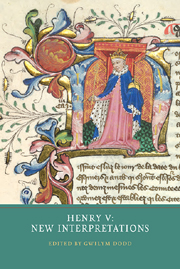Book contents
- Frontmatter
- Dedication
- Contents
- Preface and Acknowledgements
- List of Contributors
- Abbreviations
- Introduction
- 1 The Making of a Prince: The Finances of ‘the young lord Henry’, 1386–1400
- 2 Henry V's Establishment: Service, Loyalty and Reward in 1413
- 3 Henry V, Lancastrian Kingship and the Far North of England
- 4 Henry V's Suppression of the Oldcastle Revolt
- 5 Religion, Court Culture and Propaganda: The Chapel Royal in the Reign of Henry V
- 6 ‘Par le special commandement du roy’. Jewels and Plate Pledged for the Agincourt Expedition
- 7 Henry V and the Cheshire Tax Revolt of 1416
- 8 Henry V and the English Taxpayer
- 9 Henry V, Flower of Chivalry
- 10 War, Government and Commerce: The Towns of Lancastrian France under Henry V's Rule, 1417–22
- 11 Writing History in the Eighteenth Century: Thomas Goodwin's The History of the Reign of Henry the Fifth (1704)
- Index
- York Medieval Press: Publications
3 - Henry V, Lancastrian Kingship and the Far North of England
Published online by Cambridge University Press: 05 July 2013
- Frontmatter
- Dedication
- Contents
- Preface and Acknowledgements
- List of Contributors
- Abbreviations
- Introduction
- 1 The Making of a Prince: The Finances of ‘the young lord Henry’, 1386–1400
- 2 Henry V's Establishment: Service, Loyalty and Reward in 1413
- 3 Henry V, Lancastrian Kingship and the Far North of England
- 4 Henry V's Suppression of the Oldcastle Revolt
- 5 Religion, Court Culture and Propaganda: The Chapel Royal in the Reign of Henry V
- 6 ‘Par le special commandement du roy’. Jewels and Plate Pledged for the Agincourt Expedition
- 7 Henry V and the Cheshire Tax Revolt of 1416
- 8 Henry V and the English Taxpayer
- 9 Henry V, Flower of Chivalry
- 10 War, Government and Commerce: The Towns of Lancastrian France under Henry V's Rule, 1417–22
- 11 Writing History in the Eighteenth Century: Thomas Goodwin's The History of the Reign of Henry the Fifth (1704)
- Index
- York Medieval Press: Publications
Summary
Historians of the English north in the late Middle Ages have recently engaged with a number of issues of importance to students of both the English regions and of the period. Of these, two stand out for the purposes of this chapter. The first considers the prospect of the ‘far north’ as a unique frontier society, sufficiently set apart from the main currents of English society by virtue of the dictates of border warfare and its close proximity to England's perennial enemy. This envisages a region bordered, roughly, by the Scottish borders to the north, and by the palatinate of Durham and the sparsely settled county of Westmorland to the south. Lancastrian influence, as a result of the efforts of John of Gaunt and Henry IV, now extended northwards into Durham and Westmorland from Yorkshire and Lancashire: Durham by the appointment of the Lancastrian clerk Thomas Langley as prince bishop, and Ralph Neville, by virtue of his marriage to John of Gaunt's daughter and Henry IV's half-sister, Joan Beaufort, and his commensurate elevation to the earldom of West-morland. By the second half of the reign of Henry IV, both counties were solid outposts of partisan Lancastrian power. That is to say, they were controlled by a group of men whose allegiance predated and transcended their fidelity to their lord king, by virtue of their shared allegiance to him as duke of Lancaster prior to 1399.
- Type
- Chapter
- Information
- Henry VNew Interpretations, pp. 77 - 102Publisher: Boydell & BrewerPrint publication year: 2013



